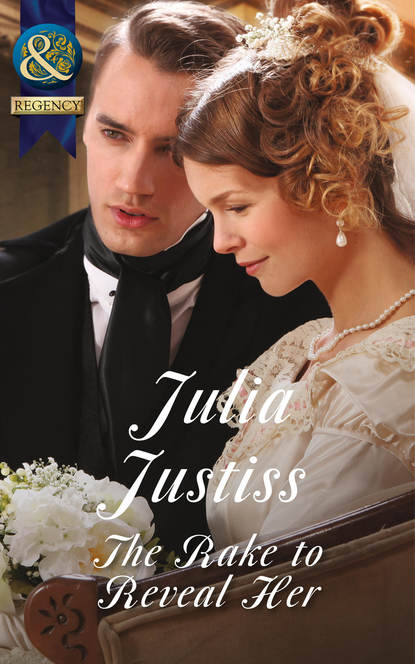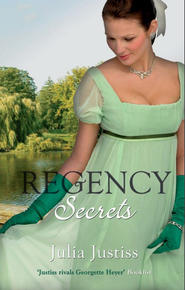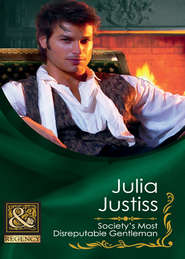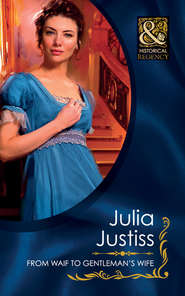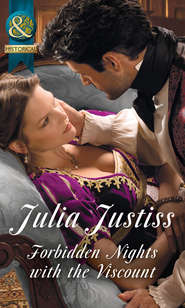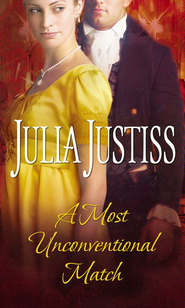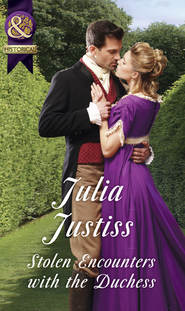По всем вопросам обращайтесь на: info@litportal.ru
(©) 2003-2025.
✖
The Rake to Reveal Her
Настройки чтения
Размер шрифта
Высота строк
Поля
How frightening and strange the English countryside must seem to a child, torn from the familiar if unstable life of travelling with an army across the dusty fields and valleys of Portugal and Spain. Especially after losing one’s last parent.
It was a daunting enough prospect for her, and she was an adult.
The extra day would allow her to go over her arguments one more time. She liked Thornfield Place very much; she only had to convince Mr Ransleigh, her mostly absentee landlord who had now unaccountably taken up residence, that turning the neglected outbuilding on his property into a home and school for soldiers’ orphans would cause no problem and was a noble thing to do.
A guilty pang struck her. She’d really been too hard on the one-armed, one-eyed man in the lane. Though he might have been injured in an accident, he had the unmistakable bearing of a soldier. Had he suffered his wounds at Waterloo? Recovering from such severe losses would be slow; frustration over his limitations might at times make him wonder if it would not have been better, had he never made it off the battlefield.
She knew it was. She’d have given anything, had Papa been found alive, whatever his condition. Or Marshall, dead these five years now.
The bitter anguish of her fiancé’s loss scoured her again. How much different would her life be now, had he not fallen on that Spanish plain? They’d be long married, doubtless with children, her love returned and her place in society secure as his wife.
But it hadn’t been fair to take out her desolation on that poor soldier. Wholly preoccupied with her own purpose, she only now recalled how thin his frame was, how dishevelled his rough clothing. When had he last eaten a good meal? Finding employment must be difficult for an ex-soldier with only one arm.
He’d not carried a pack, she remembered, so he must be a local resident. Country society comprised a small circle, she’d been told, much like the army. Which meant she’d probably encounter the man again. If she did, she would have to apologise. Perhaps in the interim, she might also think of some job she could hire him to perform at Thornfield Place.
Satisfied that she’d be able to atone for her rudeness, she dismissed him from her mind and trudged down the lane back towards Thornfield.
* * *
Nearly an hour later, Theo finally reached the stables and turned over her well-walked horse. Dismissing her irritation over an afternoon wasted, she entered through a back door, to have Franklin, her newly hired butler, inform her that a visitor awaited her.
Since she had no acquaintance in the county beyond the village solicitor she’d written to help her find staff, she couldn’t imagine who might be calling. Curiosity speeding her step, she’d reached the parlour threshold before it struck her that, according to the dimly remembered rules of proper behaviour her long-dead mama had tried to instil in her, she ought to have gone upstairs to change into a presentable gown before receiving visitors.
But the identity of the lady awaiting her drove all such thoughts from her head. ‘Aunt Amelia!’ she cried in surprise and delight.
‘My darling Theo! I’m so glad to have you home at last!’ the lady declared, encircling her in a pair of plump, scented arms.
Theo’s throat tightened as she returned the hug of her last remaining close relation. ‘I’m so glad, too, Aunt Amelia. But what are you doing here? And how did you know I was at Thornfield Place?’
‘I’d hoped you’d come to see me in London after you left Brussels. When you wrote you’d already consulted Richard’s lawyer, found a suitable country manor, and wished to get settled there before you visited, I just couldn’t wait.’
‘I’m so glad you’ve come, although I fear you’ll not find the establishment nearly up to your standards. I’m still hiring staff, and everything is at sixes and sevens.’
Pushing away, she surveyed the lady she’d not seen in over five years. ‘How handsome you look in that cherry gown! In the first crack of fashion, I’d wager—not that I would know.’
‘You’re looking very well, too, my dear—though I can’t in good conscience return the compliment about the habit.’ After a grimace at the offending garment, she continued. ‘Now that you’re finally back in England, we must attend to that! One can understand the unfashionable dress, living in all the God-forsaken places my brother dragged you, but how have you managed to keep your complexion so fresh? I thought to find you thin and brown as a nut.’
‘I’ve always been disgusting healthy, or so the English memsahibs used to tell Papa.’
‘Unlike your poor mama, God rest her soul.’ Sadness flitting across her face, she said, ‘I still can’t believe we’ve lost Richard, too.’
Steeling herself against the ever-present ache of loss, Theo said, ‘I’m glad you’ve given up your blacks; the colour doesn’t suit you.’
‘You don’t think it too soon? It’s only nine months since...’ Her voice trailed off.
‘Since Papa fell at Waterloo,’ Theo replied, making herself say the words matter of factly.
‘It just doesn’t seem fair,’ Lady Amelia said, frowning. ‘My brother surviving all those horrid battles, first in India, then on the Peninsula, only to be killed in the very last action of the war! But enough of that,’ she said after a glance at Theo—who perhaps wasn’t concealing her distress as well as she thought. ‘Shall we have tea?’
‘Of course. I’m devilish thirsty myself,’ she said drily. ‘I’ll ring for Franklin.’
After instructing the butler to bring tea and refreshments, Theo joined her aunt on the sofa.
‘How long can you stay? I’ll have Reeves prepare you a room. It’s a bit hectic with the children not settled yet, but I think we can make you comfortable.’
‘Children?’ her aunt repeated. ‘So you still have them—Jemmie, the boy your father took in when his sergeant father died? And the little girl you wrote me about. Besides Charles, of course. How is the poor little orphan?’
‘Doing well,’ Theo said, her heart warming as she thought of him. ‘A sturdy four-year-old now.’
‘Goodness, that old already! His father’s family never...’
‘No. Lord Everly’s commander, Colonel Vaughn, wrote to his father again when I returned with Charles after the birth, to inform him of the poor mother’s death in childbed, but the marquess did not deign to reply.’ She neglected mentioning how she’d rejoiced at learning she’d be able to keep the child. ‘So, he’s still with me. Indeed, I can’t imagine being parted from him.’
‘You’re quite young enough to marry and have sons who truly are your own,’ her aunt replied tartly. ‘I suppose you had to do your Christian duty and accompany that unfortunate girl, enceinte and grieving, back to England after Everly was killed. I do wish you’d made it to London for the birth, though. How unfortunate to have his mama fall ill, stranding you at some isolated convent in the wilds of Portugal! Naturally, after her death, you felt obliged to take charge of the infant until he could be returned to his family. But with that family unwilling to accept the boy and Richard gone—are you sure you should continue caring for him? As for the others, would it not be better to put them into the custody of the parish? Under a colonel’s guardianship, such an odd household might have been tolerated in the army overseas, but even with your papa present, such a ménage here in England would be considered very strange.’ She sighed. ‘You were ever wont to pick up the stray and injured, even as a child.’
‘I’m sure you would have done the same, had you been there to see them, poor little creatures left on their own to beg or starve.’
‘None the less, without Richard... It’s just not fitting for a gently reared girl to have charge of...children like that.’
Theo laughed. ‘After growing up in India and all those years following the drum, I don’t believe I qualify as “gently reared”.’
Her aunt gave her a fulminating look. ‘You’re still gently born, regardless of the unconventionality of your upbringing, and are as well, I understand, a considerable heiress. Despite your...unusual circumstances, I wouldn’t despair of having you make a good match. Won’t you come to me in London for the Season, let me find you a good man to take your father’s place in your life?’
With a firm negative shake of her head, Theo said, ‘I can’t imagine a prospective suitor would look kindly on the idea of taking in a child not his own. Since I won’t give up Charles, I doubt my fortune is large enough to tempt any man into marrying me. That is, any man I’d consider marrying.’
‘You do yourself a disservice,’ Lady Amelia protested. Giving Theo a quick inspection, she said, ‘Your figure is fine, your complexion lovely, and those brown eyes quite luminous. I’m certain my maid could do wonders with that curly dark hair. You’re a bit taller than is fashionable, but with the proper gowns, I think quite a number of eligible gentleman might come up to snuff. You are the granddaughter of an earl, after all.’
Waving Theo to silence before she could protest again, Lady Amelia continued. ‘If you love Charles as you say you do, you must know the best thing for him would be for you to marry! Give him a father to pattern himself after, someone who could teach him all those manly pursuits so important to gentleman, and introduce him to the clubs and societies he must frequent to be accepted by his peers. As for the other children... I don’t wish to set your back up, but it really would be better for them to be placed in an institution where they can learn a vocation. You do them no favours, to raise them above their stations.’
Ignoring her aunt’s words about Charles, which had the uncomfortable ring of truth about them, Theo said, ‘I don’t intend to raise the others above their stations. In fact, arranging for their proper care is the main reason I decided to come here. I have to admit, I’m looking forward to having a settled home again myself, something I’ve not had since we left India.’
She left unspoken her fear that making a life alone in England, the ancestral home in which she’d never lived, whose ways often seemed as strange to her as India’s would to her aunt, might prove a daunting task.
No matter, she would master it. She must, for the children and for herself.
‘I did wonder why you chose a manor in Suffolk. As I understand the provisions of the will, Richard left you numerous properties, along with your mama’s considerable fortune. Why did you not settle on one of them?’
‘The solicitor informed me that all the properties are let to long-term lessees, whom I wouldn’t wish to displace. So I asked Mr Mitchell to find me a suitable country manor to rent, something with a sturdy outbuilding nearby of sufficient size to be turned into a dormitory and school. A place where the children can learn their letters and be taught a trade.’
Her aunt laughed. ‘Goodness, that sounds like a great deal of trouble! Wouldn’t it be simpler to send them off to the parish? It’s only two children, after all.’ At the look on Theo’s face, she said, ‘It is just the two?’
‘Well, you see,’ Theo explained, well aware of her aunt’s probable reaction to the news, ‘Colonel Vaughn told me before we left Brussels how much he appreciated what Papa and I had done for the orphans. After Waterloo, I...found two others, and in a reply I’ve just posted to his letter enquiring about the possibility, I assured him I would be happy to take in more.’
‘Theo, no!’ her aunt cried. ‘You can’t mean to bury yourself in the country and turn into some glorified—orphanage matron, looking after the children of who knows who!’
‘Who else will look after them, if I don’t? Should I just stand by and see the offspring of our valiant soldiers end up in a workhouse? Besides, I need something useful to do with my life, now that...now that I won’t be running Papa’s household any longer,’ she finished, proud to have made it through that sentence without a tremble in her voice.
‘My dear Theo, you’re far too young to behave as if your life is over! I know you believe you buried your heart when Marshall fell at Fuentes de Oñoro. But I promise you, one can find love again—if you will only let yourself. I’m certain Lieutenant Hazlett wouldn’t want you to dwindle away into an old maid, alone and grieving.’





